You can also check out this episode on Spotify!
Our stories live in our bodies.
No one knows this better than Dr. Suzanne Koven, a master storyteller and primary care doctor at Harvard Medical School. In caring for patients for 30 years, Dr. Koven learned that patients are more than a set of organs.
“There is nothing that I can think of, there is no kind of testing, there is no sort of physiology or pharmacology that is more essential to clinical skill than the ability to elicit, interpret and communicate someone else’s story.”
It turns out that Dr. Koven has a story, too. Despite her accomplishments and accolades, as a young woman Dr. Koven felt like an imposter—a surprisingly common sentiment for career-oriented females. Her memoir, Letter to a Young Female Physician, is a series of personal essays that reveals the importance of identifying negative self-talk. The book is a must-read for women physicians and for anyone experiencing self-doubt. It’s also part of the reason she became the inaugural writer-in-residence at Massachusetts General Hospital in Boston, helping other physicians explore the art of listening, writing, and authoring our own narratives.
On this episode of Beyond the Prescription, Dr. Koven discusses with Dr. McBride how her own process of self-discovery improved her own health. Her humility and humor are just what the doctor ordered.
Join Dr. McBride every Monday for a new episode of Beyond the Prescription. You can subscribe on Apple Podcasts, Spotify, or at lucymcbride.com/podcast or at https://lucymcbride.Substack.com/listen.
Get full access to her free weekly Are You Okay? newsletter at https://lucymcbride.substack.com/welcome
Please be sure to like, rate, review — and enjoy — the show!
The transcript of our conversation is here!
Dr. McBride: Hello, and welcome to my office. I'm Dr. Lucy McBride, and this is "Beyond the Prescription." The show where I talk with my guests like I do my patients, pulling the curtain back on what it means to be healthy, redefining health as more than the absence of disease. As a primary care doctor for over 20 years, I've realized that patients are much more than their cholesterol and their weight. That we are [00:00:30] the integrated sum of complex parts. Our stories live in our bodies. I'm here to help people tell their story, to find out, are they okay, and for you to imagine and potentially get healthier from the inside out. You can subscribe to my weekly newsletter at lucymcbride.com/newsletter and to the show on Apple Podcasts, Spotify, or wherever you get your podcasts. So, let's get into it and go beyond the [00:01:00] prescription.
Today's guest is the kind of doctor I aspired to be when I was a young girl. She's someone I actually wish I had known along my arduous journey in medicine because she's a real healer and I could have used her. Suzanne is a primary care doctor. She's been practicing at Harvard Medical School and at the Mass General Hospital for over 30 years. She's now doing really important work as the inaugural writer in residence at the Mass General Hospital, as an essayist, [00:01:30] writer, and someone who conducts workshops and panels, talking about narrative and storytelling in medicine, women's health, and mental healthcare. Her essay collection was published in 2021. It's called "Letter to a Young Female Physician." I think many of us look back at our younger selves and think we have some pearls of wisdom, some advice, and that's what Suzanne is doing now for us, for me today. Suzanne, I needed you back when I was a [00:02:00] young pup struggling to find my way in medical school and residency. It was hard as a woman, as a pregnant person, and as a person who struggled herself with perfectionism and imposter syndrome. I'm so excited to talk to you today. Thank you so much for joining me.
Suzanne: And I'm thrilled to be here, Lucy. I needed me when I was young too.
Dr. McBride: Tell me about that. What was it about your youth that made you need someone like you are today?
Suzanne: Well, [00:02:30] when I wrote the New England Journal essay "Letter to a Young Female Physician" that became the title essay of my book, what I did was the essay is framed in the form of a letter to my younger self, my younger self as an intern 30 years earlier. And I had a couple of things I wanted to say to that person, which I didn't realize until later were actually quite related. But the first was that 30 years later [00:03:00] there would still be sexism, misogyny, and lack of gender equity in medicine to an appalling extent. And the second thing, perhaps more personal, was that I had spent decades, really starting in high school, perhaps even earlier, very much accelerating in medical school and residency thinking that I was a fraud, suffering from what has been called imposter syndrome. Though I didn't know that term [00:03:30] early on. And I wish that my current self could tell that self, that in fact, I was not an imposter at all. And one of the great pleasures of zooming around the country and abroad and talking to young women in medicine and some not in medicine, has been bringing that message to them now. So, I couldn't do it for myself, but it's very gratifying to be able to do it for others [00:04:00] now.
Dr. McBride: Imposter syndrome is so common, particularly in women, not just in medicine. Can you break it down? Describe it to me. How do you define imposter syndrome?
Suzanne: So, imposter phenomenon, as it was originally called when it was described by psychologists in the '70s, is a feeling of internal phoniness, or it was called intellectual phoniness. And it was originally described as occurring most [00:04:30] often in "high-achieving women." I think we all know that it's really part of the human condition. Everybody has it to some extent. The way it looks, I think, for women, particularly say, professional women, is this, you are sitting in the conference room, you're sitting in the auditorium, you're standing around the bedside, and you're thinking, "I'm the one here who doesn't belong." It's like the old Sesame [00:05:00] Street song. "One of these things is not like the others." You think, "Well, maybe my classmates, maybe my residency mates, you know, say that they're struggling, that they're overwhelmed, but they're not really overwhelmed or they're kind of normal overwhelmed. Me, I'm different. I am an utter fraud, and it will only be a matter of time before I'm found out."
In fact, I remember as a young attending [00:05:30] when I was teaching on the wards thinking, "Well, thank goodness these rotations are only a month long." Because if I stayed 31 or 32 days, they'd realize I actually didn't know anything. I'd have gone through my entire repertoire of knowledge and then, you know, forget it. I'd never make it to day 35. And there's another aspect to imposter syndrome too. It's this false belief that [00:06:00] if only I get some form of external validation, if I get into that Ivy League school, if I get that plumb residency, if I marry that particular person, if I get this promotion, if I get this prize, if I lose this weight, if I get this income, then this feeling will go away.
It doesn't work because it's always a matter of applying an external fix [00:06:30] to an internal problem. And in fact, the prizes, the brass rings, if I may, mix metaphors only kind of throw gas on the fire because the higher you rise, the more of an imposter you feel. I don't think I was ever more impostery than when I was chosen to be a chief medical resident at Johns Hopkins. The third female in 100 years, the only woman who had ever been married or had a child [00:07:00.518] and held that position. And I spent the entire year thinking, "Well, today's the day," and the day never came.
Dr. McBride: It's incredible, Suzanne, to think that you as this incredibly talented, educated, wise person thought, "God, they really blew it by picking me. And they just have no idea what they're gonna get."
Suzanne: Well, right, as I say in the book, when I was in medical school, the term [00:07:30] imposter phenomenon had already been coined, but I had never heard of it. What my best friend and I did call ourselves was the asterisks. As in we got into Johns Hopkins Medical School asterisk. There must not have been many applicants that year. And that I should mention is another feature of imposter syndrome. This sort of, yes, but... I got in, but there weren't that many applicants. I got this prize, but you know, I snowed them at the interview. I should [00:08:00] also mention about, you know, that year as chief resident because I think this is sort of, you know, resonant across the board. It is true that the day never came that anybody thought I was a fraud. The day also never came that anyone thought I was the most brilliant physician who had ever lived, or that I was perfect.
I was neither because no one is either. And I think a real sort of [00:08:30] test, a provocative test that I recommend for people who have imposter syndrome is to ask yourself this. Say, "Okay, you're right. You're an imposter. You win." Now, let's think about what the opposite of this would be. Like, how perfect would you have to be? Would you have to get A's in everything, and have the most amazing CV anybody's ever seen, and have a [00:09:00] model's figure, and a spotless home and brilliant, perfectly behaved children, you know, and dog? Well, you know, the ridiculousness of that becomes apparent very quickly. And you realize that if the way you framed it, which I think is the way we all frame it is, I'm an imposter because I'm not perfect. And then the whole thing breaks down. And [00:09:30] to sort of cut to the punchline, I think what cured me of this affliction, and it took a long time, I don't think...I was in my 50s until I really sort of let go of it. What cured me of this affliction was realizing that the things I valued most in life, the things I was most proud of, my marriage, my parenting, my doctoring, my writing were all incredibly messy, imperfect [00:10:00] processes. And yet, you know, on my worst day as a parent, or a writer, or a wife, or a doctor, I wasn't a fraud. I was just human. I was just having a bad day. I was just not perfect.
Dr. McBride: Suzanne, when I was sitting in the auditorium on the very first day at Harvard Medical School, the dean said to the whole audience of first-year medical students, "Raise your hand if you're a firstborn." And I think half the class raised their hand. And then he said, [00:10:30] "Raise your hand if you think you were the admissions' candidate that the committee looked at and said, 'You know what, this person's really not qualified, really not up to the job, but you know what, let's give this person a chance just on a lark.'" And literally, every single person raised their hand. And that's exactly what we're talking about.
Suzanne: And we can't all be frauds.
Dr. McBride: We can't all be frauds. I mean, it was just really reassuring because I think humility [00:11:00] is an important feature of the human condition. I think humility in medicin e is underrated, but humility at the expense of our emotional health and humility that then bleeds into a sense of unworthiness and that drives perfectionism, which is a futile exercise, right? Because the world isn't perfect. We are not perfect. And what is perfect anyway? And by the way, if you are "perfect," you're gonna be really [00:11:30] annoying and sort of repel other people, like the people who pretend that their whole life is perfect. Like, I don't actually have any desire to be around those people. It's inauthentic.
Suzanne: Then you really shouldn't look at Instagram.
Dr. McBride: Well, you shouldn't. Yeah, social media certainly doesn't help. And had I been exposed to social media as a youngster with some version of imposter syndrome, it would've been, you know, pretty bad. But what I wonder for you, Suzanne, I wonder what drove your imposter [00:12:00] syndrome. I think for some people it's a family dynamic, like a parent who's undermining or insulting, the parent who's constantly criticizing the young girl's weight, even though they may not even be overweight. I think it can be from the patriarchy, our structure in this country, right? And then I think it can be just an internal sort of ruminative, sort of mental space where people just overthink and they have intrinsic anxiety. What do you think it was for you?
Suzanne: Well, I wanna go back [00:12:30] to something you said earlier because this does relate about how everybody has a little imposter syndrome and you know, it's on the spectrum with humility. And humility is a good thing. And the extent to which, feeling like we're not good enough drives us to be better, to learn more, to do better. A little dose of imposter syndrome is a good thing. Decades of self-flagellation, not so good. I think in my case, and in many cases, [00:13:00] and boy, I really learned this from my readers who wrote to me, particularly women of color, women practicing medicine in highly patriarchal countries told me that very often imposter syndrome is a kind of internalized bias. You know, women told me, "Well, sure, I feel like an imposter. I get told I am an imposter all the time."
I think in my case, it was a combination of I had wonderful, supportive parents [00:13:30] and I led a very privileged youth with a wonderful education. But I think there were two things going on. One was just I grew up in the '60s and '70s, sort of on the cusp of second-wave feminism. When girls had to wear dresses and itchy tights to school and boys could wear whatever they wanted. And I was the youngest of three, had two [00:14:00] older brothers. And the message I got, I don't think specifically from my parents, but just from the sort of the ambient environment, was that my prospects were in some way more limited or if I chose to be ambitious, that I would also have to look good, be thin, have good hair, set [00:14:30] a nice table, and accommodate men.
My mother went to law school as a 43-year-old woman in 1970, having been a housewife her whole adult life, that was pretty progressive. My father supported her in this endeavor, that was pretty progressive. Yet did she ever miss a beauty parlor appointment? She did not. Did she still set a beautiful table? She did. [00:15:00] Was that really stressful? It was. So, there was that, just ambient sexism for women of color, for members of LGBTQ community, for people with disabilities, that kind of internalized bias is much more extreme. I hear this a lot from our international medical graduates and our international students from our first-gen students who say, "I know [00:15:30] I'm here, but do I really belong here?" And a lot of self-doubt that's coming from the outside in.
The other piece of it though has to do with what we were just talking about, about, you know, a little imposter syndrome is a good thing. So, for me, what that looked like was, I think I was a smart kid. I think I was very ambitious, and I think there were times when I, as the corporate cliche goes, [00:16:00] now I got a little ahead of my skis. I wanted to do things that I didn't know quite how to do. I put myself in a position to sometimes fail and embarrass myself. You know, taking an advanced class that I wasn't really prepared for, this kind of thing. I think the peak of that actually was in elementary school when I was bragging to everybody that I could play the piano. In fact, I could play "Eleanor Rigby," I've never told this story before. [00:16:30] I could play "Eleanor Rigby." This was sixth grade, Mrs. Brecher [SP], public school, 139 in Brooklyn. So, Mrs. Brecher was game to have me go to the piano. We had a piano in the room in public school and play "Eleanor Rigby."
And I sat down at the piano and I knew the first couple of notes, I had picked them out, and that's all I knew. And the whole class waited with bated breath. And then Mrs. Brecher told me I could take my seat. That [00:17:00] happened to me a lot. And I think my interpretation of that wasn't what it should have been, which was, you know, if you wanna play the piano, you probably should take lessons and practice and then you could maybe play the piano. My reaction to that, the conclusion I drew was, "Well, you see, you see, you're bad at that. You embarrassed yourself. [00:17:30] You're the worst." And I did that a lot, and I think I sort of, it was almost a self-fulfilling prophecy.
Dr. McBride: Suzanne, I love that story of you at the piano. I can picture you in your itchy tights, maybe some sweaty palms, and perhaps the mental gymnastics afterwards that you just went through. What interests me so much about patience, and I think this applies to you as well, is how we internalize those feelings, those moments, how we [00:18:00] internalize the ambient air as you discussed earlier, like the overt and subtle, sometimes, sexism in our world, and how that affects how we feel about ourselves, how we think, how we process stress, how we relate to other people. And so I wonder if you could talk about your health. How did your story and then the narratives you were telling yourself rightly or wrongly manifest in your health?
Suzanne: Well, I've been blessed with pretty [00:18:30] good health, but what I would say is over the years as a woman in this culture, I chased around the sort of the weight loss scheme of the moment. Even when I, as a physician, knew it was either nonsense or unhealthy. I did that for years. I did things that I would have and in fact, did counsel my own patients not to do, you know, high protein, low protein, [00:19:00] high carb, low carb. I mean, you know, like many women, I sort of chased this around for years. Here's a different example though, and a more recent one that I will confess, which is that it was recommended to me at least a couple of years ago, that I consider medication for osteoporosis to prevent fractures. My response to this very, very reasonable recommendation, in fact, [00:19:30.396] a recommendation I've given to countless women myself was, I didn't say this, I just thought it, was, "Oh, that doesn't fit in with my brand." My brand is that I'm youthful and I'm more than that. I'm tough. I'm so tough that in my 60s I take no medications. I have an unblemished record. I mean, seriously, where is that thinking coming from? From a primary care doctor, [00:20:00.608] it's ridiculous.
Dr. McBride: It's so refreshing, Suzanne, to hear you say that.
Suzanne: Oh, wait, I'm not finished. It gets better. So, then a few weeks ago, in fact, I fall and I get a really bad wrist fracture and it's then suggested again that I might reconsider. And of course, my first reaction is, well, no, I have two reactions, both of which are unhelpful. One is, [00:20:30] "But no because if I start taking a medication associated with older women, I'll become an older woman." Well, I mean, I am an older woman, and two, "Oh, this is all my fault. If I had done what I was told to do, I never would've had this fracture." Which completely disrupted a lot of family plans and has proved to be extraordinarily painful ordeal. It was a lot of [00:21:00] self-recrimination. And so I sort of swirled around all that unhelpful thinking for quite a while. And then finally, and this took weeks, sort of landed in a more reasonable place, which was, you know, maybe I should sit down and talk with my doctor and think about what the best plan would be.
I think what I'm getting at is there's a sort of magical [00:21:30] thinking that I know I've indulged in, which is kind of like, if I do this, then it means this. Well, again, we should interrogate this and ask, "Who says?" I once had a patient years ago, I actually tell this story in my book, who had multiple risk factors for cardiovascular disease, including hypertension. He would not take medication for his hypertension, which was uncontrolled [00:22:00] despite his efforts with exercise, and diet, and so forth. Why wouldn't he? He was a very intelligent, reasonable person. Why wouldn't he? Well, because his father had taken blood pressure medication, his father had had cardiovascular disease, and in his mind, even though he knew it wasn't rational if he took the kind of medication his father took, he would end up like his father. Which, of course, is exactly the opposite [00:22:30] of what the intention would be, and probably the outcome would be. But I think that this is something we perhaps underestimate in our patients and in ourselves.
Another story I tell in the book is of a man who was chronically hypoxemic. I mean, walked around with blue lips, did not have enough oxygen because of a chronic lung condition, but would not use oxygen, which would have made [00:23:00] him feel much better. Why? Well, he was a very suave, beautifully dressed, handsome man, and to him, oxygen tanks and tubes were ugly, which they are. And also he prided himself in the fact that even though he had chronic lung disease, he led a very active life. And to him having an oxygen tank [00:23:30] at home was a capitulation. It was giving up even though it would have actually made him feel better and probably made him more mobile. I hate to even use the term irrational because that feels pejorative. It made sense to him psychologically. And, of course, the years, the many visits in which I said, "Please, please, please use oxygen" and got nowhere, I think was ultimately [00:24:00] because I didn't sort of fully grasp what it meant to him.
Dr. McBride: Suzanne, you are basically encapsulating what it's like to be a physician, what it's like to be a patient, and then what it's like to be a human being.
Suzanne: I have been all three.
Dr. McBride: You have been all three, you've done them imperfectly, but you've done them well enough that you have so much wisdom and insight about yourself and also about what people bring to the doctor's office. I mean, [00:24:30] I have countless stories like you just described, where like, for example, my patient who refuses to take an antidepressant in conjunction with the therapy and the AA and the other modalities to treat mood instability because he is not his sister who is, in the family, the mentally ill one. I don't know his sister, but as I try to explain to him. We don't even have to call this mental illness, we have to call this you, [00:25:00] and you're not getting better despite your valiant efforts to improve mood. Let's not deprive you of the benefits of modern medicine. Let's also not hang our hat on Prozac to solve all the problems that you have.
But I think that the point is, and the point I think you're making is that we bring our stories, we bring our narratives to the decisions we make in our everyday life and then to our doctors. And the mistake that doctors can make and often do is to scold, to [00:25:30] shame. Repeat, repeat, repeat, repeat the same advice without trying to understand what lives behind the curtain of this person's story. It's not that they're necessarily a difficult patient or non-compliant, it's often that they have a story that is true to them. And sometimes I find that the story that's true to them is actually a story I need to know when they're "right." And I need to pull back on the advice that I'm giving them. But I think what I'd love to talk to you about [00:26:00] next is this understanding of wellness that we started talking about before we recorded.
To me, wellness is about checking your cholesterol and your blood pressure, and making sure you get your colonoscopy and your mammogram when you're due. It's also about understanding our stories and our narratives, fact-checking them against reality, and then having a sense of agency over our everyday health. And if I can help people [00:26:30] like you have helped people in your primary care role pull away from the instant, that instant where you're telling yourself, "Suzanne Koven," that, "I'm a failure because I broke my wrist." And then help them recognize that narrative and then course-correct and get them the treatment they need without the guilt and shame that they brought on themselves. That to me is health. That's like the varsity Ph.D. version of health. That's better than having perfect cholesterol or, you know, perfect body mass index is agency, [00:27:00] awareness, and insight. And then bonus, some humor about yourself because I hear you chuckling that your ridiculousness of not taking the medicine that your doctor recommended and shaming yourself for breaking your wrist because we all know that that's just what it was.
Suzanne: Well, so here's the thing. You know, people aren't organ machines. In this week's "New England Journal" in fact, there's a lovely video essay made by a current neurosurgery resident [00:27:30] reflecting on a rotation he did with a family doctor in South Carolina. And it's about 10 minutes. It's open access. I highly recommend it. It's called "A Good Catch." I think it really expresses beautifully what we all are afraid as clinicians and as patients is being lost in medicine. This family doctor that the resident rotated with knew his patients for decades. He went fishing with them. [00:28:00] He knew the local sheriff, so that when he was speeding in this community to go deliver a baby, the sheriff, you know, wasn't arresting him for speeding. I mean, this all sounds in some way terribly romanticized. And perhaps we don't all want to practice in small communities like this, but it really gets at something which is that it's not enough to know what the X-ray showed, what the blood work [00:28:30] showed.
And this isn't just kind of mushy, squishy let's be nice kind of stuff. It's really important for accurate diagnosis and for effective treatment to know who this person is. Now, I'll tell you what a good doctor is. The very doctor who recommended medication messaged me just yesterday and said because, [00:29:00] of course, when you have something like a wrist fracture, you in the care of orthopedist, you're not really with your primary care doctor. My primary care doctor messaged me yesterday and said, "You know, I've been thinking about how hard this is." This is my right hand. "I've been wondering whether you can write."
Dr. McBride: I mean, give that woman a bonus.
Suzanne: Oh, wait, there's more. "And what this is like for you. Would you like to make an appointment to just talk about this?"
Dr. McBride: Suzanne, you and I [00:29:30] will be dead before that is the standard. But wouldn't it be amazing if we could replace the billions and billions and billions of dollars that are being spent on technologies, which, of course, are wonderful, and we could spend it on time with a doctor to build trust and rapport to understand the whole person.
Suzanne: Right. Well, I'm more optimistic than you are, I'm hoping. Well, I may be dead. I don't think you will be.
Dr. McBride: I mean, who knows?
Suzanne: God bless. [00:30:00] I think patients totally get this, and I think clinicians get it too. And I'll tell you the lens through which I understand that is the work I do in narrative, in literature and medicine, medical humanities. What's happening there is that we are talking about medicine at the level of sort of looking at the complete experience. The literature gives us permission [00:30:30] to do that. It also breaks down the false separations between clinicians and patients, between doctors and nurses, and so forth. And I think that reading stories, talking about literature makes us just so acutely aware of the many layers of everybody's story and the extent to which we enhance not only [00:31:00] the patient's experience, but here's the little secret, our own experience when we engage as much of the story as we can.
Dr. McBride: I completely agree. I've said this a million times, but that I believe our stories live in our bodies and we need to access them and connect the dots between our stories, our lived experiences, and our thoughts, feelings, behaviors. I guess what I mean about I'll be dead before it's the standard of care [00:31:30] for the primary care doctor to call and check about your emotional health, is that I think the structure of medicine right now makes it very, very difficult for people to have time to build that kind of rapport with their primary care doctor, or for the doctor to have time and then for the patient to even begin to understand how relevant their story is.
Suzanne: And it's terribly shortsighted, even from an economic point of view, because here's what happens. The patient doesn't feel heard, the doctor feels rushed. [00:32:00] I realized a long ago that I was using prescriptions and test ordering as a way to move things along. So, more prescriptions, more testing, more frustration, oh, and then by the way, then the doctor quits and you have to replace the doctor. And that's very expensive. So, I think ultimately if we had more time, we would all be happier. And I really think [00:32:30] it would save money. This sort of, that everything has to be evidence-based. Everything has to be cost-effective. I think is really backfiring. And it's not only in medicine. You hear this in teaching, in law. I heard it recently from my literary agent that professions that used to be based on relationship are now being based on money, on testing...
Dr. McBride: Metrics.
Suzanne: ... [00:33:00.137] on metrics. And I think everybody's unhappy about it. I will tell you that when I do sessions and I've done them all over the country and beyond, when I do sessions where I'm reading poetry with doctors, nurses, chaplains, therapists, patients, and I've been doing this a long time, I've not yet had one person say to me, "I don't have the faintest idea what you're talking about or why you're here."
Dr. McBride: That's the cure for imposter syndrome right there. Same thing as [00:33:30] when I say to patients, if I have a new patient in my primary care office and I say, "You know, here's how I think about medicine. It's about the inseparability of our mental and physical health. It's about how our stories live in our bodies. It's about you understanding you, and then me trying to help you as a guide." And I've never had anybody say, "Wow, that's weird." Do you know what I mean? I've never had anybody say, "Well, I just came to get my blood pressure checked, and that was it." In other words, people want to be seen. They want to be heard, not just [00:34:00] for the sake of being seen and heard, but because they want to be well and they want to have agency over their own health. They don't wanna feel like their health is just about that one visit and winning the appointment by getting good lab results. So, I wonder how you would define wellness in your words.
Suzanne: I must confess I've grown to detest that word.
Dr. McBride: I hear you.
Suzanne: Because I think it's become all too often, and this is not an original thought with me, many have said [00:34:30] this. It's become all too often as sort of band-aid. Here's what we'll do. We'll completely stress you out, and then we'll give you free coupons to SoulCycle and it'll all be fine. I think the wellness has become kind of an add-on. I like the term health better.
Dr. McBride: Let's talk about health. What is health? What is actual health?
Suzanne: I think that health is feeling [00:35:00] as good as you can to do what you wanna do for as long as you can. I define it in terms of how you feel and how you function, and also in terms of a kind of a sense of continuity or a sense of longevity. But you get to decide how long feels right to you. It involves a sense of being heard, dare I say, [00:35:30] even being loved.
Dr. McBride: Loved. I think love is there.
Suzanne: Don't get me started on that because we'll both start crying. But I will tell you...
Dr. McBride: I tell my patients, if you're not crying in my office, you're not getting your money's worth out of this visit.
Suzanne: When I was in the same practice for 32 years and I took care of extended families, grandchildren of grandparents, and so forth, and I loved primary care. I still love primary care. I never got burned out. Well, I did for a while, [00:36:00] but I recouped. But I was a very happy primary care doctor. And then when it was time to move on and do this other work that I do in writing and teaching, I asked myself, "You know, what was this all about?" You kind of schlep through the days, particularly when you're raising children and you're going from one week to the next, and then you sort of step back and say, "What was this all about?" And in the last few months of my practice, after [00:36:30] my patients knew I was leaving, they told me what it was all about.
There were cards, there were notes, there were bottles of wine. It was all quite wonderful. And here's what was interesting. Not one of them said, "Remember when you made that incredibly smart diagnosis." Though I made a few in 32 years, and not one of them said, "Oh, you remember when you prescribed that drug that I had a bad [00:37:00] reaction to?" And I did that too, I'm sure. The compliments were all, "Remember when I told you that thing I had never told anyone before? Remember that night you came to see me when I was in the emergency room?" And the barbs, there were a couple, not too much, were on the order of, "Remember when I didn't do that thing that you recommended? I thought you were a little judgmental," and I [00:37:30] probably was. So, I thought, the successes were successes of connection. The failures were failures of connection. So, what it was all about was love. And I really did love my patients. And I think, and I write about this in the book. I think I did my best work when I was [00:38:00] just on the border of inappropriate. And what I mean by that is not... That sounds very sort of salacious.
Dr. McBride: I actually know exactly what you mean.
Suzanne: What I mean by that is, you know, the kinds of things that you say to a longtime friend, "Hey, Joe, this job is making you sick. When are you gonna retire already?"
Dr. McBride: That's an intervention that's better than Lipitor.
Suzanne: Much better.
Dr. McBride: Well, what it is, is you gave permission to your patients to be [00:38:30] known and to be loved. And that opens the door to really, really intimate conversations that could potentially change someone's life. And to me as a primary care doctor, those are the most important moments and the most gratifying moments.
Suzanne: It's an incredible privilege.
Dr. McBride: That's what fills us up, is being part of someone's life. And what you have done by shining a light on people's stories and then your own stories, is you're giving people permission to think deeply about their own stories. [00:39:00] That is what I hope I do now, that is what I aspire to do, and that's why I'm doing this right now. Maybe someone who's listening right now is thinking, "Gosh, I've had imposter syndrome my whole life, and that drives my ridiculous urge to diet or my desire to appear like I have it all together when actually I'm really struggling. And maybe I should talk to my doctor about how I feel, and maybe I should connect the dots between my general malaise and my blood pressure. And maybe my blood pressure [00:39:30] is about not just genetics and how much salt I have, but it's also about sleeplessness, and anxiety, and my despair." That's health to me. And that's hard to achieve, but it's possible.
Suzanne: You touched on something that I think is important, which is that the individual personal story can sometimes feel like self-indulgence. It's actually an act of generosity, [00:40:00] I think, to share a story. When I started doing very personal writing, I thought, "You know, gosh, this is kind of weird. I'm talking about my imposter syndrome and my daddy issues in the New England Journal of Medicine." But the mail I got from readers was not, "You know, wow, you're a fraud. I'm glad you're not my doctor." Again, that wasn't the mail I got. And similarly, the writers I coach, the medical students, [00:40:30.145] graduate students, healthcare workers I coach. They have two fears about personal writing.
One is, what will my boss, my program director, my mother, my patients think, and the other is, my story's too small. This is too self-indulgent. I'm supposed to be in a caregiving role and here I am talking about myself. And [00:41:00] I think one thing I try to do is to kinda unravel that and make people realize that what we are moved by is individual stories. And I think you have to kind of do it as you're doing it, as I've been doing it, to believe the effect that it can have.
Dr. McBride: Yeah. I wanna read you this quote that I love I go back to all the time, and I think it pertains to how you think about yourself. You think about your patients and how you think about [00:41:30] the human condition. I'd love you to read this essay, and I'll put it in the show notes. "If we want the rewards of being loved, we have to submit the mortifying ordeal of being known." And I think we are sometimes terrified of being known to others, to our doctors, and to ourselves. And when we can give ourselves permission to understand our stories, understand how our everyday life has [00:42:00] informed how we present in the world and how we treat ourselves, I think we're a lot healthier.
Suzanne: I mean, the old cliche isn't to know me is to hate me, right?
Dr. McBride: Correct. That's not a good saying. That's not on bumper stickers.
Suzanne: That's not on bumper stickers.
Dr. McBride: We're all human, we're all "imposters." Like I said in the beginning, and I truly, truly mean this. Like you, I had a baby in my first year of residency at Johns Hopkins working 100-105 hours a week. I really, really [00:42:30] struggled. Learning that I was pregnant, hiding it, telling people, getting the reaction I didn't expect, not getting the support I needed, not asking for the support, not knowing that I could ask for support. Muzzling through doing a lumbar puncture on an HIV-positive patient when I was nine months pregnant, not thinking that was unusual at all. Getting in a fight with my mom who said she thought that was dangerous, and I didn't think there was anything wrong with that. That was my job. And had I had permission to feel [00:43:00] all the complicated feelings I felt, and to have a place to put them, and to feel seen... I wish, God, Suzanne, I, first of all, can't wait to come up to Boston and have lunch with you.
Suzanne: Anytime.
Dr. McBride: And I just really appreciate what you're doing. It gives me comfort, it gives me fuel to continue to help other people tell their stories. And you're really a role model whether you like it or not.
Suzanne: Oh, I like it. There's nothing not to like about it. And [00:43:30.547] I love what you're doing, and comfort and fuel, I couldn't ask for more. Thanks for saying it.
Dr. McBride: Suzanne, thanks for joining me.
Suzanne: Thank you, Lucy.
Dr. McBride: Thank you all for listening to "Beyond the Prescription." Please don't forget to subscribe, like, download, and share the show on Apple Podcasts, Spotify, or wherever you catch your podcasts. I'd be thrilled if you liked this episode to rate and review it. And if you have a comment [00:44:00.318] or question, please drop us a line at infolucymcbride.com. The views expressed on this show are entirely my own and do not constitute medical advice for individuals. That should be obtained from your personal physician. "Beyond the Prescription" is produced at Podville Media in Washington, D.C.



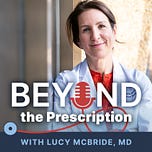

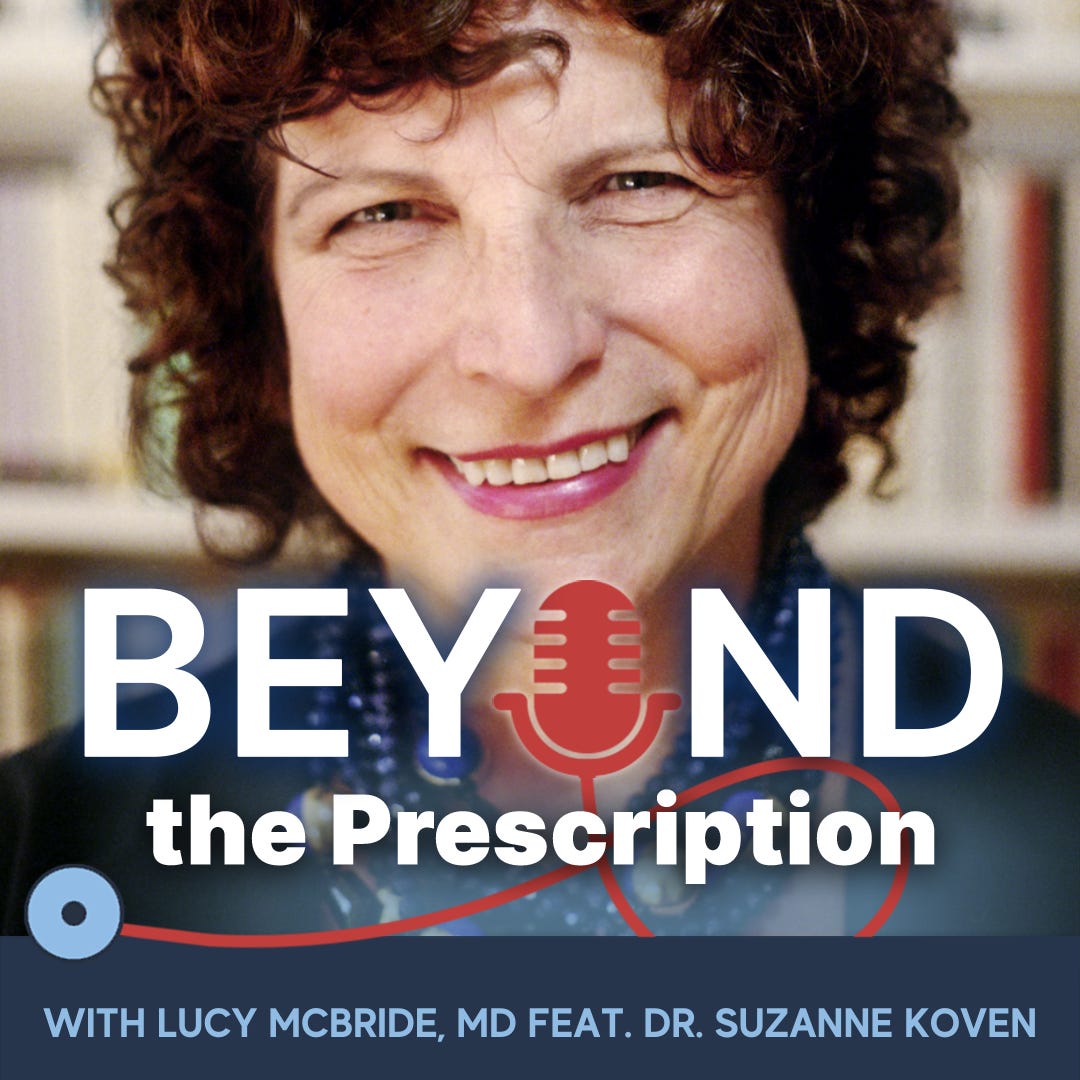

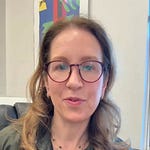

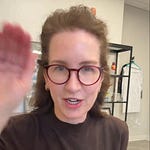
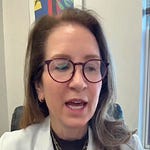
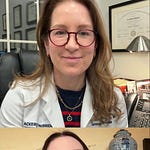
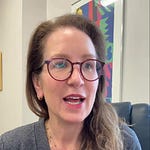


Share this post